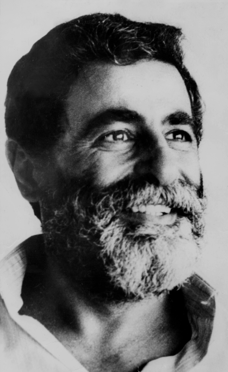[”A Profile from the Archives“ is a new series published by Jadaliyya in both Arabic and English in cooperation with the Lebanese newspaper, Assafir. These profiles will feature iconic figures who left indelible marks in the politics and culture of the Middle East and North Africa.]
Name: Hassan
Known as: Hamdan
Father`s name: Abdullah
Date of birth: 1936
Date of death: 1987
Name of wife: Avlin Braun
Children: Kareem/Yasmin/Rida
Nationality: Lebanese
Academic degree: PhD in philosophy
Group: Political activist
Nickname: Mahdi `Amel

Hassan Hamdan (Mahdi `Amel)
- Lebanese
- Born in the town of Haroof, in the Alnabatiya district, in 1936. He moved to Beirut when he was a child with his parents and siblings.
- Wife: Avlin Bran, they have three children: Kareem, Yasmin and Rida.
- Father: Haj Abdullah Hamdan, textile merchant and property owner in Al-Ghubairi area.
- Sister: Samya.
- Went to high school in Al-Maqasid School in Beirut in 1955. He travelled to France in 1956 where he continued his university education in Paris. He received his PhD in Philosophy from the University of Lyon.
- Joined the Lebanese Communist Party in 1960.
- Traveled to Algeria in 1963 and worked in education in the teachers` bureau in Al-Qustantiniyah city, and wrote several articles for "The African Revolution" magazine, published in Algeria.
- Returned to Lebanon in 1976 and worked as a teacher in the Sayda high school for girls. He later moved to the Institute of Social Sciences as a fulltime professor in the Lebanese University, teaching in Philosophy, Politics, and Methodologies.
- He started to work in "Al-Tareeq" magazine under the name "Mahdi `Amel," which he used in all his writings later.
- He was elected as a member in the Central Committee of the Communist Party in the Fifth Convention in 1987.
- He was a prominent member of the Union of Lebanese Writers.
- He was a member of the Cultural Council of Southern Lebanon.
- He was a member of the Union of Professors in the Lebanese University.
- He signed his poems under the name "Hilal bin Zaytoon."
- His struggle was not limited to writing but he practiced what he said by travelling in cities and villages, lecturing, discussing and explaining several causes, like nationality and liberation, to the people in a simple clear language. He was known in these discussions as "comrade Tariq."
- He was assassinated on 18 May 1987, near his house in the area of Al-Mulla in Beirut, while on his way to the Institute of Social Sciences in the Lebanese University where he used to teach.
- Consequently, the day of the 19 May was announced a "day of support for freedom of speech and scientific research."
- After his martyrdom, his articles and educational books which he wrote between 1968 and 1973 were gathered and published in 1991 in a book entitled "In Issues of Teaching and Educational Policies." In these articles, he analyzed the Lebanese state`s educational policy of the Lebanese State that works to destroy the official educational process and deepen sectarian loyalties in order to reproduce the political-class-sectarian system.
Some of his Notable Writings:
- Theoretical Introductions to Study the influence of Socialism on the National Liberation Movement.
- Conflict of Arab Civilization or Conflict of Arab bourgeoisie?
- Theory in Political Practice: Research in the Causes of the Lebanese Civil War.
- Introduction to Critique of Sectarianism: The Palestinian Cause in the Ideology of the Lebanese Bourgeoisie.
- Marx in Edward Said`s Orientalism: Intelligence for the West and Passion for the East?
- In the Process of Ibn Khaldun`s School of Thought.
- Introduction to the Critique of Sectarianism in the Sectarian State.
Some of his Poetry:
- Time Improvisations (signed by Hilal Bin Zaytoun).
- The Space of N (Signed by Hasan Hamdan).
- He acted in several plays like "Jobran and Al-Qaeda."
Some of his Quotes:
- "You are not defeated as long as you are resisting."
- “It is a great risk to think of your reality in Arabic."
[This article was translated from the Arabic by Ali Adeeb Alnaemi. Click here for the Arabic text.]